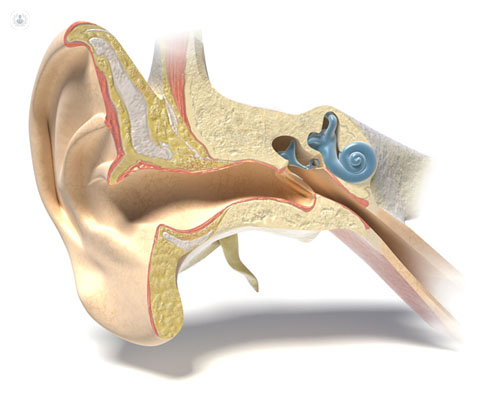

What is otoneurosurgery?
Otoneurosurgery is the branch of neurology dedicated to surgically treating all pathologies encompassed within it, including diseases affecting the inner ear and a number of nerves that run through or near the ear (facial, auditory, vestibular and lower cranial pairs, hypoglossal, vagal and spinal). Treatment includes acoustic neuroma surgery, posterior fossa surgery and surgery of the lateral region of the skull base, among others. The otorhinolaryngologist is the specialist who will perform the surgery, with microscopic practice and the precision required for working in narrow areas.

Why is otoneurosurgery performed?
Otoneurosurgery is performed for the early diagnosis of peripheral and central lesions, or a pathology of the lateral base of the skull, and is also used to treat these problems. The diagnosis of acoustic neuroma is based on a high index of suspicion of impaired hearing and vestibular functions. It is the otorhinolaryngologist who, using various otoneurosurgical techniques and approaches, will have knowledge about the auditory and vestibular pathways, organ preservation and rehabilitation of hearing with cochlear implants, and assessment of balance using dynamic posturography. Neurosurgery also encompasses knowledge of the facial nerve and the ability to manage the nerve and rehabilitate associated conditions.
What does otoneurosurgery involve?
Otoneurosurgery involves using different surgical approaches to correctly assess the person’s condition. These include presigmoid approaches, such as retrolabyrinthine, translabyrinthine, transcochlear and transotic, or burr holes made in the middle cranial fossa. These are common practices in the otorhinolaryngologist’s work. In addition, infratemporal approaches and the combination of many of these allow access to more complex local injuries. Traditional neurosurgical approaches, such as the retrosigmoid approach and the extreme lateral approach also come under otorhinolaryngology.
The specialist will usually apply a local anaesthetic before making the necessary incisions and performing the procedures, and will recommend the most appropriate approach in each case.
Preparing for otoneurosurgery:
Prior to otoneurosurgery surgery, the otorhinolaryngologist will check to make sure that you have no ear infections. To do this, they will perform several tests, including an ear examination and hearing test. In some cases, a CT scan of the head will also be required. It is also important that you ask the doctor what medications you may or may not take. You may need to stop taking some medications (aspirin, anti-inflammatory drugs, or anticoagulants) a week prior to the procedure.
Post-surgery care:
You will have to follow some guidelines to ensure proper recovery after the procedure. The otorhinolaryngologist will advise you to avoid any risks of knocks to the ear, prevent water from entering the ear, and to avoid flying, swimming or diving, as well as excess strain.
